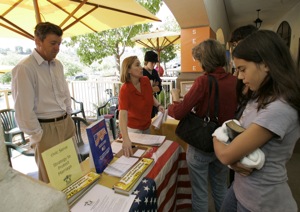-
- Calif. religious leaders push for same-sex marriage ban
- Lawyer says Foley never had inappropriate contact with minors
- Breakaway Episcopal bishop ousted
- Matthew Shepard memorial dedicated in Wyoming
- Oklahoma’s Inhofe launches campaign ads with anti-gay tone
- Son of NC televangelists takes on discrimination
- National News Briefs
- World News Briefs
san diego
Local religious leaders debate same-sex marriage at council forum
Gay panelist says God created him the way he is
Published Thursday, 02-Oct-2008 in issue 1084
Religious opponents of same-sex marriage questioned its validity and its effect on the family structure Sunday during a forum on Proposition 8, the November ballot initiative that, if passed, will define marriage as a union between a man and woman.
Hosted by the Ecumenical Council of San Diego County, the forum – the second in a series of four – aimed to increase dialogue about same-sex marriage among religious voters.
Attorney Stanwood Johnson, who called himself the only conservative evangelical panelist, said the Supreme Court over-extended itself in May, when it reversed a California law banning same-sex marriage. Same-sex couples began marrying in June.
“Same-sex marriage is not recognized by God, the vast majority of other states and the vast majority of other countries, [therefore] it doesn’t exist,” Stanwood said.
Stanwood’s claim echoes that of many opponents to same-sex marriage, who say the high court’s ruling was “judicial activism.”
Voters, including thousands from different religious backgrounds, have lined up on either side of the Proposition 8 debate, which has provoked fervent fund-raising and activism by supporters and opponents. More than 100,000 religious proponents of Proposition 8 are expected to gather at Qualcomm Stadium three days before the Nov. 4 election to rally to pass the initiative, and some local churches have become involved in the nationwide effort to ban same-sex marriage in California (see story, page 16).
Rev. James Mathes of the Episcopal Dioceses of San Diego moderated Sunday’s forum and encouraged all participants to stay open-minded and “accept thin places of ambiguity as places for God’s presence and voice.”
Terry McGoldrick, a moral theologian at the University of San Diego, emphasized traditional links between marriage and procreation.
“Children have always been a part of the idea of sexuality,” McGoldrick said. “To separate that does violence to both.”
McGoldrick referenced the Roman Catholic Church’s long-standing belief that a union between a man and woman is grounded in “natural law,” which, the church says, is the basis for all law.
Rev. Scott Landis of the Mission Hills United Church of Christ said sexuality, however, is also innate.
“God has created me the way I am,” said Landis, who is gay.
Johnson said, regardless whether sexuality is innate, religious people have to strive against it.
“I may have the desire to be greedy or be a vengeful person, but we still have to overcome that,” Johnson said.
Rev. Gloria Espeseth, who opposes Proposition 8, said not all principles in the Bible are appropriate ground to frame public policy.
In her opening statements, Espeseth – of the Gethsemane Lutheran Church in San Diego – compared religious voters who are divided over same-sex marriage to early Christians, who disagreed whether to allow non-Jews to join the church.
Espeseth also mentioned Bible passages others use to condemn homosexuality, and said extensive research of the verses on both sides has ended, essentially, in a “stalemate.”
During the question and answer session that followed the forum, an audience member asked whether churches would be forced to perform same-sex marriages if Proposition 8 fails.
Johnson said the Supreme Court noted specifically churches would not be required to perform the marriages, though, he said, it was added as a footnote to the ruling and may resurface in the future.
Espeseth countered Johnson’s response, saying clergy occasionally refuse to marry opposite-sex couples, and that the right to refuse is not applicable only to same-sex marriage.
“By denying to marry someone, I am not denying their right to marry,” Espeseth said. “I am exercising my responsibility.”
Another audience member asked Johnson how same-sex marriage threatens marriage as an institution.
“Does it have to be a threat if it goes against God’s will?” Johnson replied.
Prompted by an audience question, the panelists also addressed whether it is a sin to engage in homosexual activity. Espeseth said every relationship, same- or opposite-sex, will experience sin. In medieval times, she said, the Catholic Church posted manuals in confessionals describing which specific sex acts were classified as appropriate – “though, that’s a complicated way to go about it,” she quipped.
Darwin Mann of Carmel Valley, one of the forum’s attendees, said the panelists’ conversation and the ensuing question and answer helped others see people with different views “as having legitimacy.”
Les DeLashmutt of Hillcrest said he’s seen an evolution in the way people approach same-sex marriage.
“As more people get to know other persuasions and opinions, they have to confront themselves and the people they deal with,” he said.
For more information on upcoming forums hosted by the Ecumenical Council, visit gaylesbiantimes.com/links.
|
|
Copyright © 2003-2025 Uptown Publications


